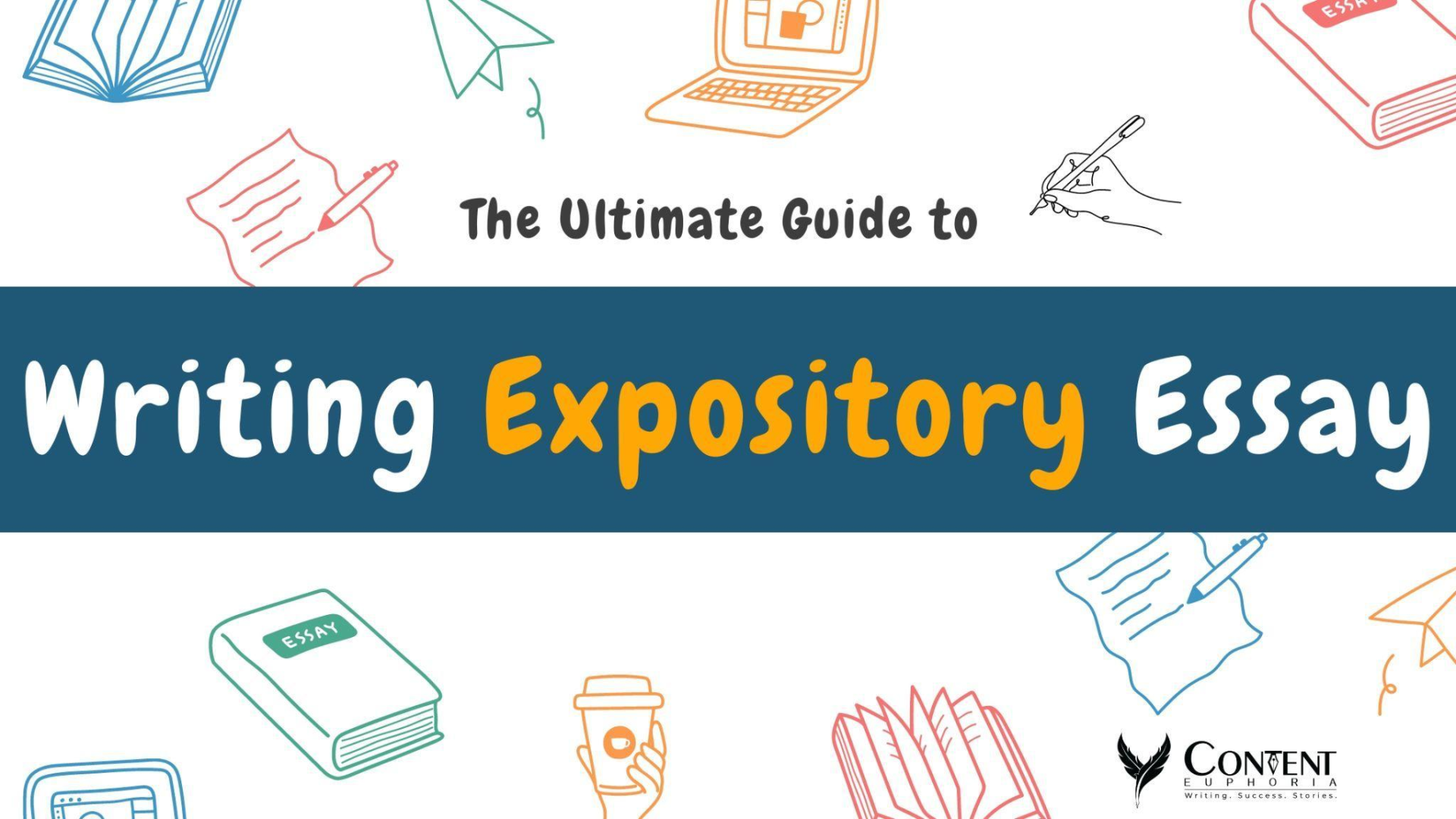Essays are commonly used in academic settings but are also found in other forms, such as blogs, newspaper articles, etc. There are different types of essays, such as Expository essays, persuasive (or argumentative) essays, Descriptive essays, and Narrative essays.
It is crucial to choose the right kind of essay that is most relevant to the selected topic and effectively convey the message to the readers. Whether for academic evaluation or broader communication, understanding the nuances of essay writing is essential.
The four main types of essays are:
Narrative Essays:
- Purpose: To tell a story or recall an event.
- Characteristics: It includes characters, a plot, and a setting to engage the reader. The author often uses descriptive language to create a true-to-life experience.
Descriptive Essays:
- Purpose: To paint a picture or realistically describe a person, place, object, or experience.
- Characteristics: Focuses on sensory details and imagery to evoke a strong impression. The goal is to make the reader feel like they are experiencing the described subject.
Persuasive (or Argumentative) Essays:
- Purpose: To persuade the reader to adopt a particular point of view or take a specific action.
- Characteristics: Presents a clear argument or stance on an issue, supported by evidence and reasoning. It often includes a counterargument and a strong conclusion reinforcing the prominent position.
Expository Essays:
- Purpose: To inform, explain, or describe a concept, idea, or process.
- Characteristics: Presents factual information, often with a thesis statement or central idea. It is structured logically with a clear introduction, body paragraphs, and conclusion.
Each type of essay serves a different purpose and requires distinct approaches in terms of structure, tone, and content. Understanding the characteristics of each type helps the writer effectively convey their message and engage their audience.
This is a comprehensive step-by-step guide to writing Expository Essays, and we’ll dive deeper into this topic further.
What is an Expository Essay?
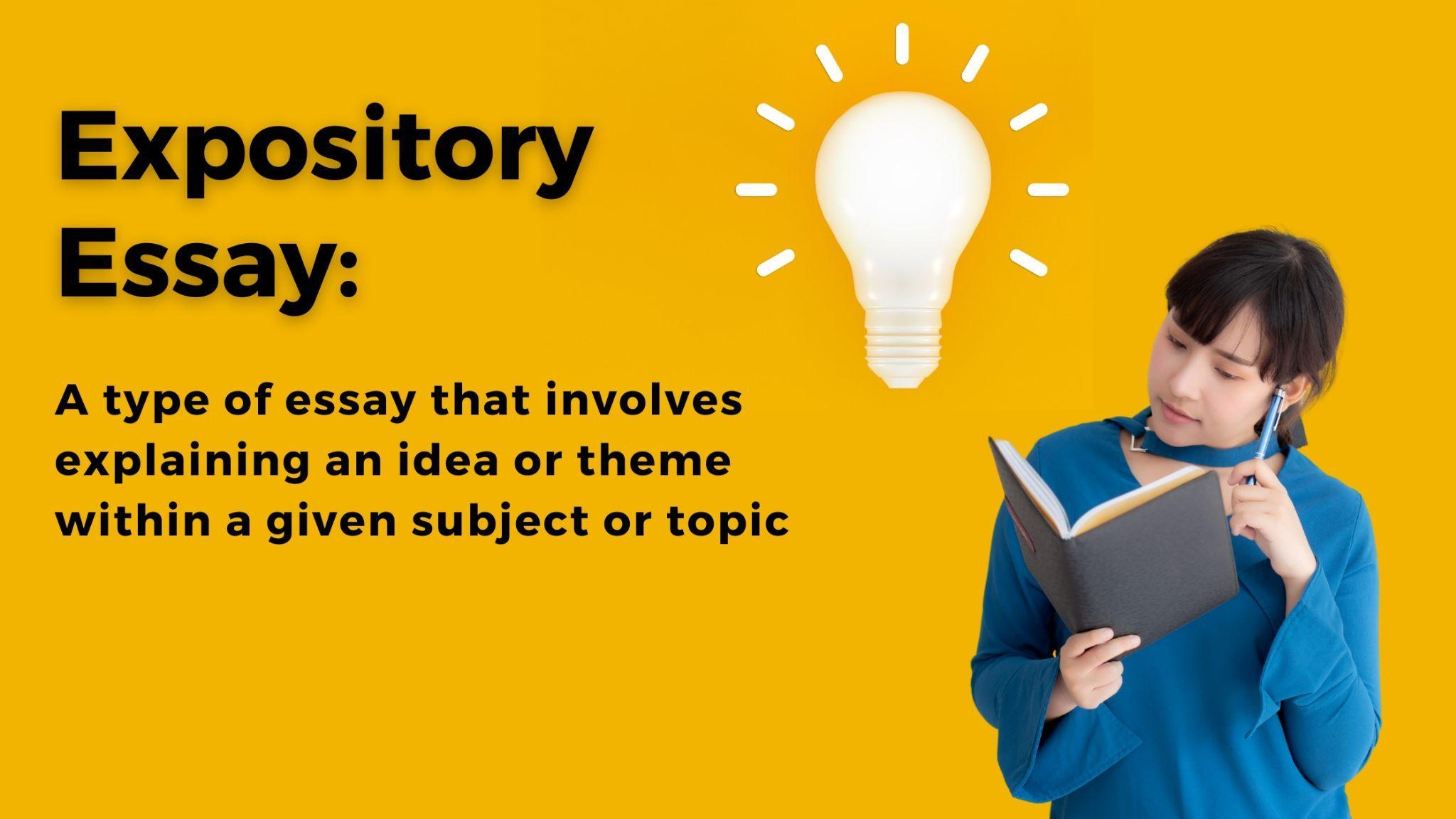
An expository essay is a helpful guide that provides clear and straightforward information without personal opinions. It is like explaining the rules of a game to a friend. The key objective of an expository essay is to share facts, present ideas, and ensure clarity for the audience. It operates as a teaching tool, helping readers understand without unnecessary confusion.
Some Main Features of an Expository Essay Are –
- Straightforward Information: Content states the facts, maintaining simplicity without personal feelings or opinions.
- Clear Structure: The essay is cautiously organized, showcasing a step-by-step guide with a distinct beginning, middle, and end – just like a story.
- Examples and Evidence: In an expository essay, examples or evidence are provided to facilitate a better understanding of the subject.
- No Surprises: Unlike a mystery novel, an expository essay avoids surprises. As a guide, the content writer ensures everything is clearly laid out for the reader.
What Is the Purpose of Expository Writing?
Unlike some other types of essays, expository essay writing primarily focuses on providing factual information and presenting a balanced, objective analysis of a subject.
The purpose of an Expository Essay is to –
- Convey Information:
- Clarity: The expository essay aims to present information in a way that is easily understandable to the reader. It avoids confusion by providing straightforward explanations.
- Objectivity: The content writer stays neutral and objective, avoiding personal biases or opinions. The goal is to offer an unbiased view of the subject matter.
- Explain Ideas or Concepts:
- Simplifying Complex Concepts: Expository essays often deal with topics that may be complex or unfamiliar to the reader. The content writer breaks down these concepts into simpler parts, making it easier for the audience to understand.
- Step-by-Step Guidance: In cases where a process or procedure is involved, the writer provides step-by-step guidance, ensuring the reader understands each stage.
- Clarify Relationships and Connections:
- Cause and Effect Relationships: Expository essays may explore cause-and-effect relationships, elucidating why certain events occur and their consequences.
- Comparison and Contrast: Some expository essays compare and contrast different aspects of a subject, highlighting similarities and differences.
- Educate the Audience:
- Promote Understanding: The ultimate goal is to ensure that the reader understands the topic comprehensively. This involves going beyond surface-level information and getting into the depth of the subject matter.
- Enhance Knowledge: Expository essays expand the reader’s knowledge of a specific subject. This can be exceptionally advantageous in academic settings.
- Meeting Academic and Professional Standards:
- Academic: In an academic context, expository writing is often used to explain the topics to students by researching, analysing, and presenting information coherently.
- Professional Communication: In professional settings, the ability to convey information clearly and objectively is crucial. Expository writing skills are valuable in fields where effective communication is required.
In summary, an expository essay is a versatile form of writing that serves to inform and enlighten.
Although expository essays are a versatile form of writing, it is important to understand when to write an expository essay.
When to write an expository essay?
As discussed above, the purpose of an expository essay is to inform, explain, or describe a concept, idea, or process. Thus, an expository essay is a good choice for the said goal. Here are some everyday situations in which writing an expository essay would be an appropriate choice:
- Academic Assignments: Expository essays are frequently assigned in educational settings. Teachers often use this type of essay to see a student’s understanding of a particular subject or to teach them how to research and present information effectively. They are common in subjects such as English, history, science, social studies, or any discipline that requires a clear explanation or analysis of a topic.
- Educational publication: Any form of educational content, such as textbooks, online courses, and educational websites, should choose expository essays as the form of writing.
- Research papers: In academic and scientific fields, expository writing is commonly used to write research papers, explaining the research methodology and clarifying complex topics in a simpler manner.
- Reports and manuals: Expository writing is highly suitable when writing a report and a step-by-step guide for some process topic.
- Informative blog posts: Bloggers often use expository writing to create informative and educational content for their audience. This style helps engage readers by presenting information in a straightforward manner.
- Testimonials and reviews: Testimonials or writing reviews state the facts, and the indent is clear, i.e., to explain a precise viewpoint to the readers and intended party. This is nothing but expository writing.
- Instructional or How-to Writing: While writing step-by-step instructions or guides on how to perform a task, solve a problem, or achieve a specific outcome, an expository essay is an appropriate format. This type of writing is commonly used in manuals, guidebooks, tutorials, or any instructional material.
- Journalism or News Writing: Expository writing is prevalent in journalism, where the goal is to inform readers about current events, news stories, or investigative reports. Journalists strive to present objective information, provide background details, and explain complex issues clearly to their audience.
- Professional or Technical Writing: In various professional fields, such as business, healthcare, engineering, or law, expository writing is utilized to convey information to colleagues, clients, or the general public. This includes writing reports, memos, manuals, research papers, or any form of communication requiring clear and factual information presentation.
Types of Expository Essays
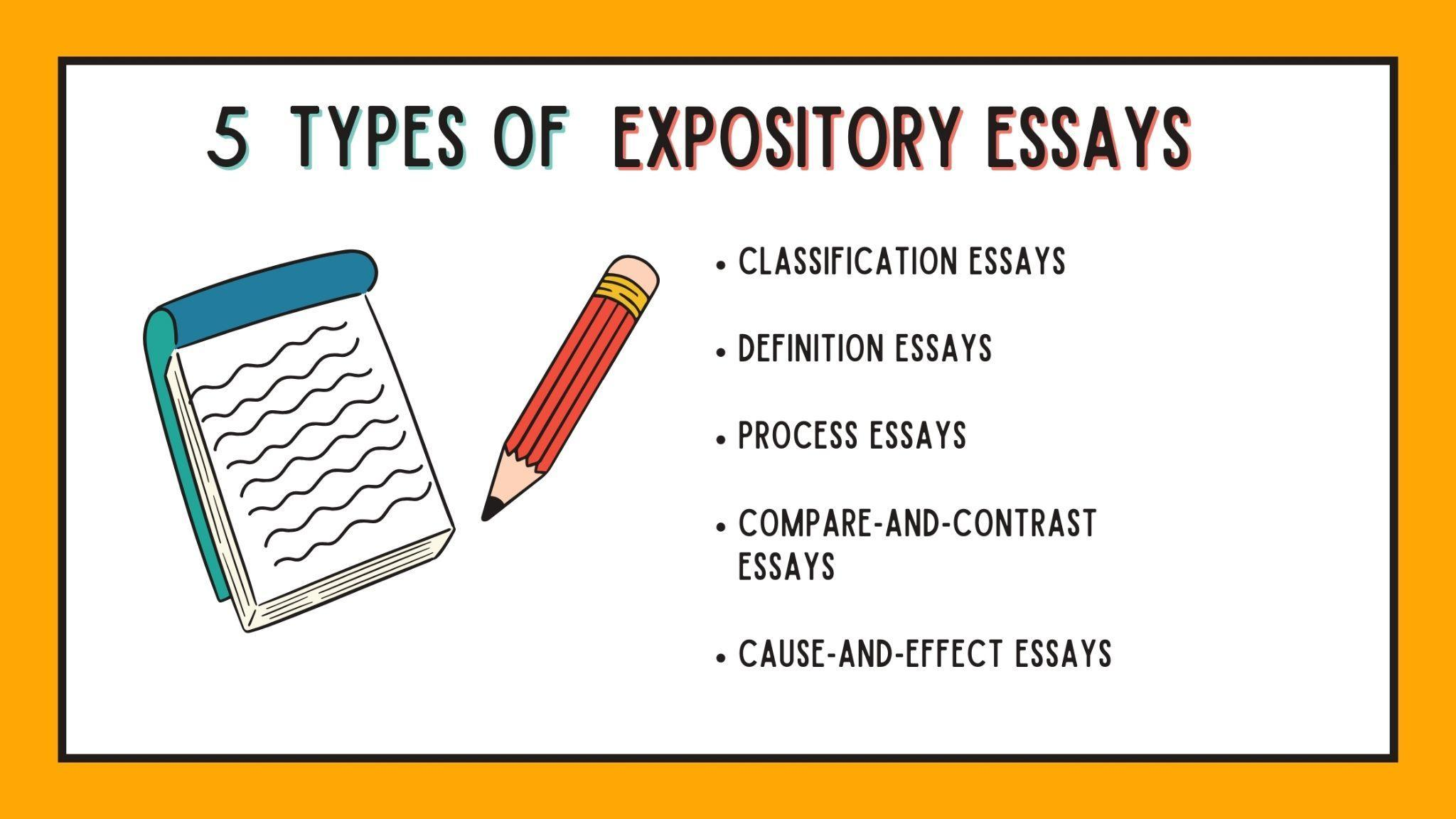
Expository essays are generally classified into 5 major types. Each type has different characteristics while holding the base purpose of an expository essay.
5 Types of Expository Essays –
- Classification Essays
A classification essay is a type of expository essay that aims to organize and categorize information into distinct groups or categories based on specific criteria. The primary purpose of a classification essay is to provide clarity and understanding by breaking down a more extensive subject into smaller, more manageable parts.
Key Features of a Classification Essay:
- Categorization:
The essay categorizes a broad subject into specific groups or classes. Each category should have clear boundaries and be distinct from the others. - Criteria for Classification:
The classification is based on specific criteria or characteristics that define each category. These criteria are essential for organizing the information logically. - Organization:
The essay follows a structured organization, typically with an introduction, body paragraphs discussing different categories, and a conclusion summarizing the key points.
Example – Classification Essay:
| Classify travel destinations into categories such as historical landmarks, natural wonders, cultural hubs, and adventure spots. Explore the unique characteristics of each category and the specific destinations within them. |
2. Definition Essays
A definition essay is a type of expository essay that explains the meaning of a term, concept, or idea by providing a clear and detailed definition. Definition essays offer a comprehensive understanding of the chosen term or concept, often exploring its history, origins, and various interpretations. Unlike other types of essays, a definition essay goes beyond a simple dictionary definition, diving into the complexities and slight variations associated with the topic.
Key Features of a Definition Essay:
- Extended Definition:
The essay provides an extended or expanded definition of the chosen term, offering more than a basic dictionary definition. - Clarity and Precision:
Definitions are presented with clarity and precision, ensuring that the reader gains a comprehensive understanding of the term. - Thesis Statement:
The thesis statement clearly presents the term to be defined and the characteristics that will be explored in the essay. - Multiple Perspectives:
The essay may explore different perspectives or interpretations of the term, acknowledging variations in meaning.
Example – Definition Essay: “Success Redefined”
| Challenge common notions of success by defining it not only in terms of wealth or fame but also in personal fulfilment, growth, and positive contributions to others and society. |
3. Process Essays
A process essay is a type of expository essay that includes a step-by-step guide to complete a particular task. The primary purpose of a process essay is to provide readers with a clear and detailed understanding of how to perform a particular activity or complete the process. This type of essay emphasizes the chronological order of steps and aims to guide the reader in a systematic manner.
Key Features of a Process Essay:
- Sequential Presentation:
The steps or stages of the process are in a logical and chronological order. Each step depends on the previous one. - Clarity and Detail:
The essay provides clear and detailed explanations for each step, ensuring the reader can follow the process accurately and seamlessly. - Transitions:
Effective use of transitions between steps helps maintain a smooth flow in the essay and ensures that the reader can easily progress from one stage to the next. - Objective Tone:
Like other expository essays, a process essay maintains an objective and informative tone. It focuses on the task at hand without any interference of personal opinions or emotions.
Example – Process Essay: “Crafting the Perfect Sandwich”
| Guide readers through the step-by-step process of making a sandwich, from selecting ingredients to the end, i.e. serving on a plate. |
- Compare-and-Contrast Essays:
A compare-and-contrast essay is a type of expository essay that examines the similarities and differences between two or more subjects. The primary purpose of this essay is to analyze and showcase the relationships and distinctions between the chosen subjects. Whether comparing two ideas, events, individuals, or works of literature, a compare-and-contrast essay seeks to highlight both the shared elements and unique qualities of each subject.
Key Features of a Compare-and-Contrast Essay:
- Clear Thesis Statement:
The thesis statement clearly identifies the subjects to be compared and contrasted, as well as the specific points of comparison. - Point-by-Point or Block Structure:
The essay can follow either a point-by-point structure, where each paragraph alternates between subjects, or a block structure, where all the information about one subject is presented before moving to the next. - Objective Analysis:
The analysis is objective and focuses on presenting facts and observations. The content writer should avoid Personal opinions or biases. - Balance of Similarities and Differences:
The essay maintains a balance between highlighting similarities and differences. It does not focus solely on one aspect over the other.
Example – Compare-and-Contrast Essay: “City Living vs. Country Living”
| Explore the differences and similarities between living in a city and living in the countryside. Examine aspects such as lifestyle, amenities, and environment to provide a comprehensive comparison. |
- Cause-and-Effect Essays: Unravelling the Threads of Time
A cause-and-effect essay is a type of expository essay that explores the relationship between events or situations where one action leads to a specific result or outcome. The primary purpose of a cause-and-effect essay is to analyze and explain the causal links between various phenomena, illustrating how one-factor influences or contributes to another.
Key Features of a Cause-and-Effect Essay:
- Clear Thesis Statement:
The thesis statement clearly outlines the cause-and-effect relationship to be explored in the essay. - Objective Analysis:
The analysis is objective and focuses on presenting the cause-and-effect relationship based on evidence and logical reasoning. - Structured Organization:
The essay is typically organized with a clear structure, including an introduction, body paragraphs discussing causes and effects, and a conclusion. - Balance of Causes and Effects:
The essay maintains a balance between discussing the causes and effects, ensuring a comprehensive examination of the relationship.
Example – Cause-and-Effect Essay: “Impact of Technology on Social Interactions”
| Investigate how the widespread use of technology has caused shifts in social interactions. Explore the reasons behind increased connectivity but decreased face-to-face communication, analyzing the effects on relationships and community dynamics. |
All the above are the five main types of expository essays, amongst which a content writer has to choose while approaching the expository essay.
How to approach an Expository Essay?
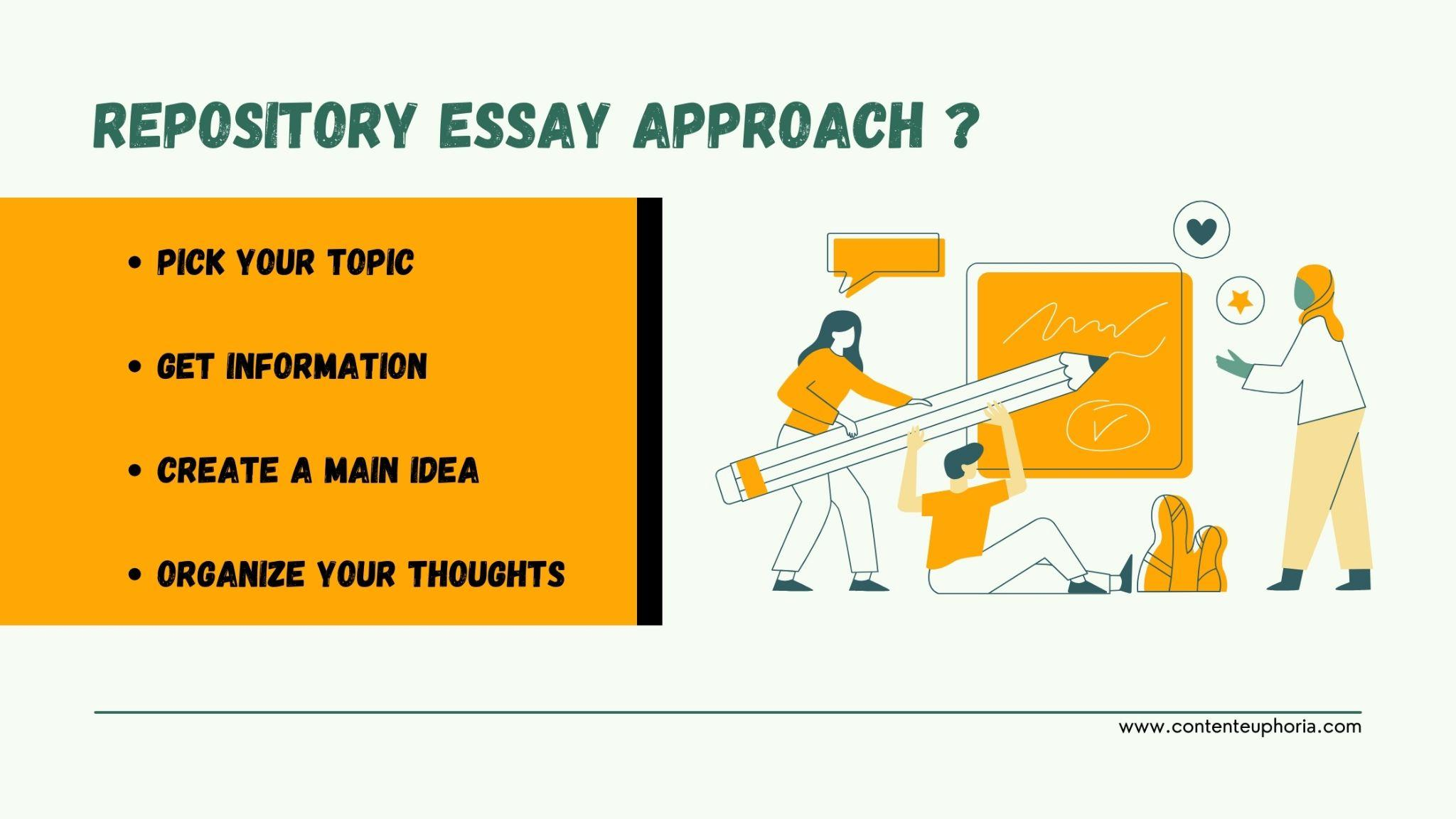
Let’s simplify the process of making an expository essay outline with these essential steps:
- Pick Your Topic:
Begin by choosing a specific topic for your expository essay. Make sure it’s clear and not too broad, so you can explain it effectively within your essay.
- Get Information:
Do some research and gather relevant information, facts, and evidence about your chosen topic. This will help support the points you make in your essay.
- Create a Main Idea:
Come up with a short and clear main idea, known as a thesis statement. This statement should capture the core of what you’ll be explaining in your essay.
- Organize Your Thoughts:
Arrange your ideas and supporting points in a logical order. Group similar ideas together, and think about the best sequence to present them, ensuring a smooth flow in your essay.
By following these simple steps, you can build a well-structured expository essay outline that makes your writing process transparent and effective.
How to Create an Expository Essay Layout?
Creating a clear and effective layout for your expository essay is like constructing a roadmap before embarking on a journey. An expository essay typically comprises three main parts: the introduction, body paragraphs, and conclusion.
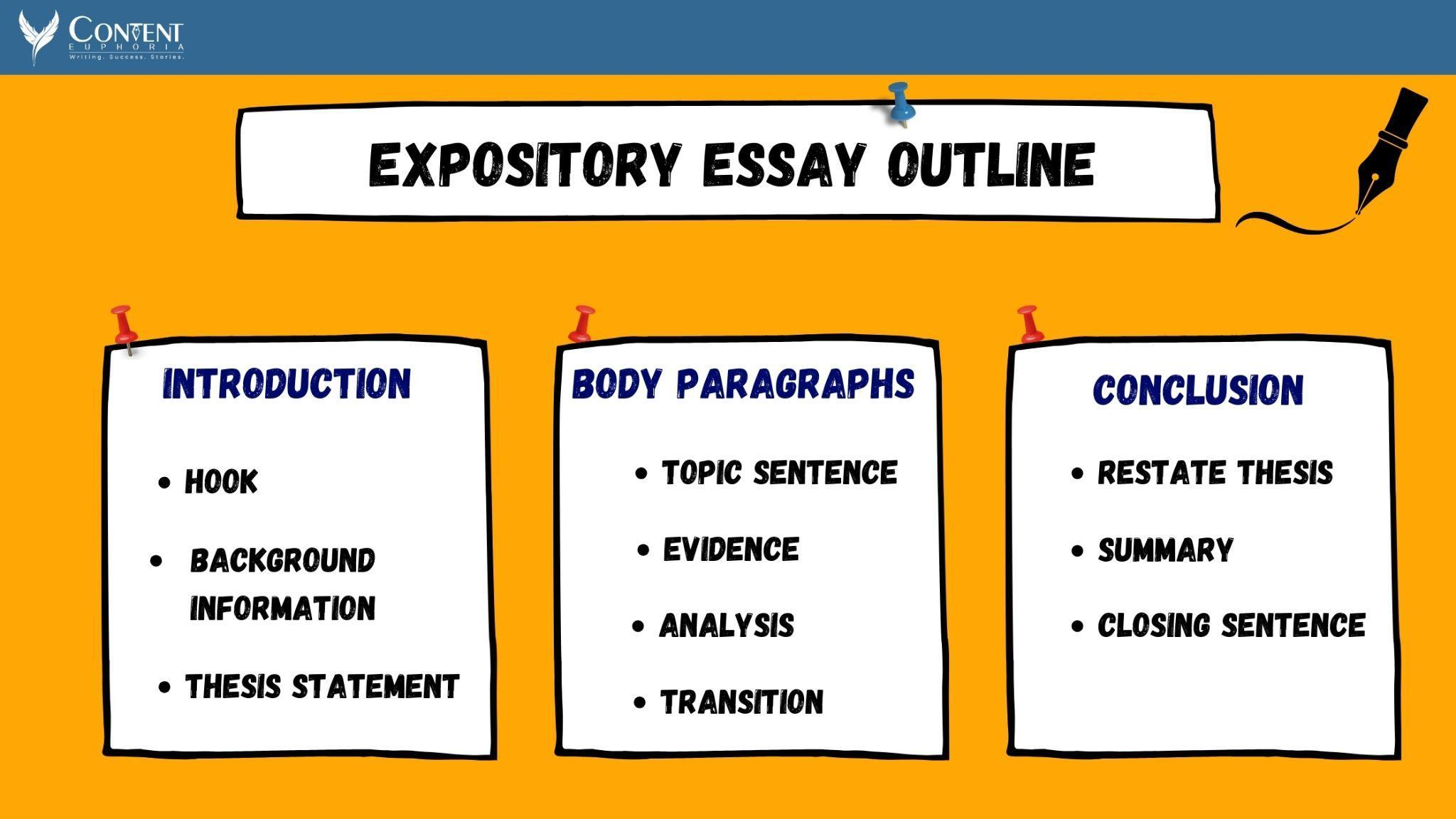
Here’s a step-by-step guide to building an organized expository essay structure:
- Introduction:
- Hook: Start with a captivating fact, question, quote, or anecdote.
- Background Information: Provide brief context related to the topic.
- Thesis Statement: Clearly state the main point of your essay.
- Example Introduction:
o Hook: “Did you know that a single tree can absorb as much as 48 pounds of carbon dioxide per year?”
o Background Information: “In a world grappling with environmental challenges, the role of trees in carbon sequestration is often underestimated.”
o Thesis Statement: “This essay explores the vital role of trees in mitigating climate change, emphasizing the need for conservation efforts.”
- Body Paragraphs (x3):
- Paragraph 1: Introduce the first main point, explain it, and provide supporting evidence.
- Paragraph 2: Present the second main point, explain, and support it.
- Paragraph 3: Introduce the third main point, explain, and provide supporting evidence.
- Example Body Paragraph (Topic: Importance of Tree Canopy):
o Topic Sentence: “The expansive canopy of trees plays a pivotal role in reducing temperatures and creating microenvironments.”
o Explanation: “Through the process of transpiration, trees release water vapor, leading to a cooling effect in their surroundings.”
o Supporting evidence: “Research conducted in urban areas with extensive tree cover has shown a noticeable reduction in ambient temperatures.”
- Conclusion:
- Summary: Recap the main points discussed in the body paragraphs.
- Restate Thesis: Express the main point in a fresh way.
- Closing Thoughts: Leave the reader with a thought-provoking idea or call to action.
- Example Conclusion:
o Summary: “In conclusion, the significance of trees in mitigating climate change extends beyond their aesthetic appeal, emphasizing their role as environmental superheroes.”
o Restate Thesis: “As stewards of this planet, it is our collective responsibility to recognize and protect these silent guardians of our climate.”
o Closing Thoughts: “In planting and preserving trees, we not only contribute to a healthier environment but also invest in a sustainable future for generations to come.”
By following this structure, your expository essay becomes a well-organized narrative, guiding readers through a logical progression of ideas.
How to Write an Expository Essay?
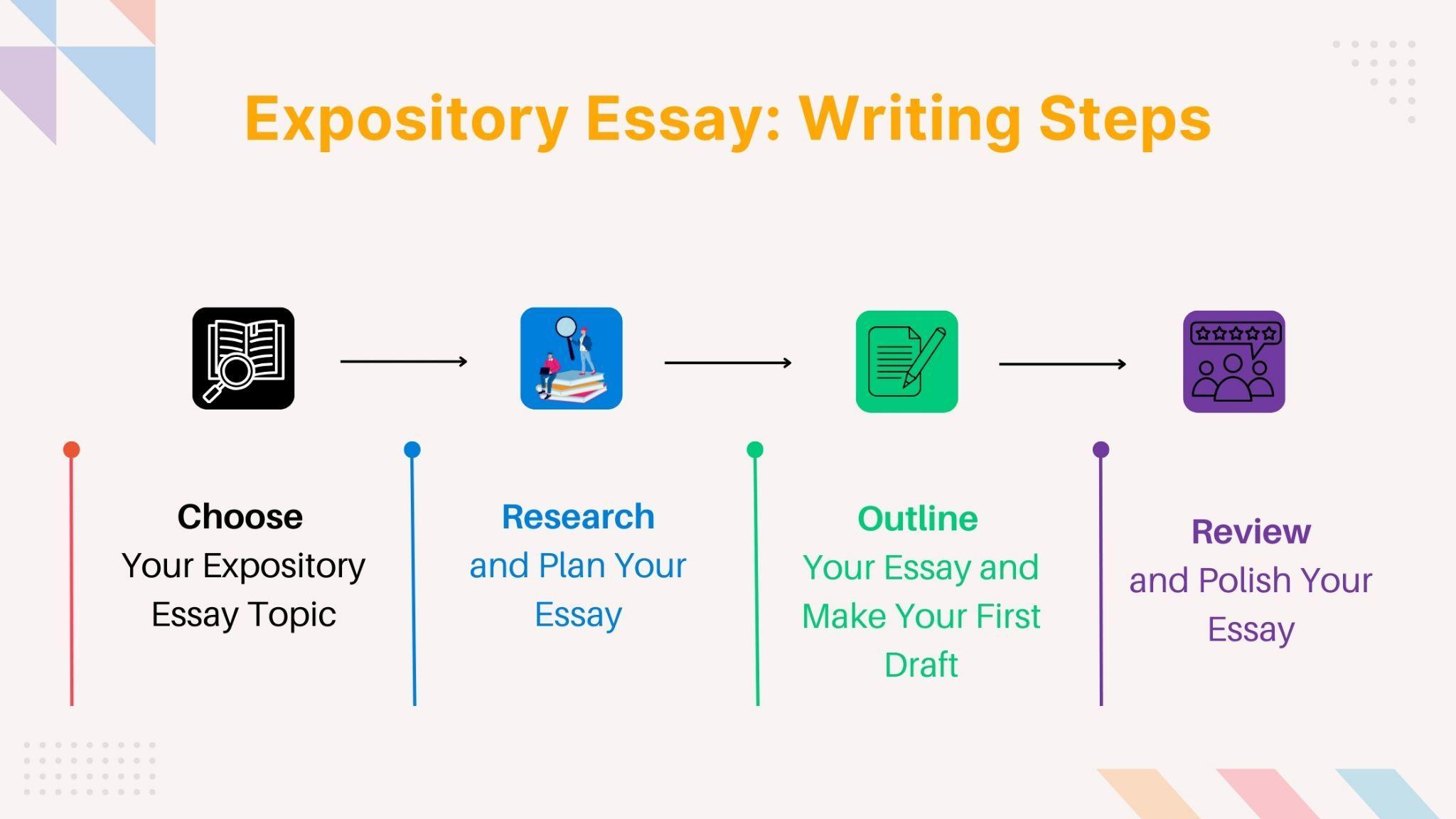
Now that the groundwork is laid let’s navigate the process of actually writing the expository essay. Here’s a detailed guide through each stage:
- Prewriting:
- Research Thoroughly: Dive into reputable sources to gather comprehensive information on your chosen topic.
- Identify Key Points: Determine the main ideas you want to convey and the evidence that supports them.
- Organize Thoughts: Utilize brainstorming techniques to outline the flow of your essay.
- Example Prewriting (Topic: Impact of Social Media):
| – Research: Explore studies on the psychological effects, societal impact, and communication dynamics influenced by social media. – Identify Key Points: Psychological impact, societal changes, communication dynamics. – Organize Thoughts: Create a mind map linking subtopics and supporting evidence. |
- Drafting:
- Start with a Strong Thesis: Clearly articulate the main point in your introduction.
Develop Each Body Paragraph: Ensure a clear topic sentence, followed by an explanation and supporting details. - Logical Flow: Organize paragraphs in a coherent manner, each contributing to the overall thesis.
- Example Drafting (Continuing Social Media Essay):
| – Thesis Statement: “The pervasive influence of social media extends beyond individual behaviour, shaping societal norms and altering communication dynamics.” – Body Paragraph 1 (Psychological Impact): a) Topic Sentence: “Social media platforms impact users’ mental well-being in various ways.” b) Explanation: “Studies have shown a correlation between heavy social media use and increased feelings of isolation and anxiety.” c) Supporting Details: “Instances of social comparison and cyberbullying contribute to these negative psychological effects.” |
- Revising:
-
- Review for Clarity: Ensure that each paragraph contributes to the overall thesis.
- Modify for Smooth Transitions: Check for logical transitions between paragraphs.
- Refine Sentences: Clarify language for better readability.
- Example Revising (Continuing Social Media Essay):
| – Review for Clarity: Assess whether each paragraph directly addresses an aspect of social media’s impact. – Transitions: Ensure seamless connections between paragraphs discussing psychological impacts and societal changes. – Refine Sentences: Clarify complex ideas, ensuring they are accessible to a broad audience. |
- Editing:
- Correct Errors: Address grammar, punctuation, and spelling issues.
- Consistency: Check for consistent style, tone, and tense throughout the essay.
- Paragraph Structure: Verify that each paragraph has a clear structure with a topic sentence and supporting details.
- Example Editing (Continuing Social Media Essay):
| – Correct Errors: Use proofreading tools and seek feedback to identify and rectify grammatical mistakes. – Consistency: Ensure that the tone remains objective and the style is suitable for an expository essay. – Paragraph Structure: Confirm that each paragraph maintains a clear structure, reinforcing its respective point. |
- Proofreading:
- Read Aloud: Catch any lingering errors by reading the essay aloud.
- Adherence to Guidelines: Confirm that the essay aligns with assignment requirements.
- Final Polishing: Make any necessary adjustments to enhance overall coherence.
- Example Proofreading (Continuing Social Media Essay):
| – Read Aloud: Identify awkward phrasing or unclear sentences by reading the essay aloud.
– Adherence to Guidelines: Cross-check against assignment instructions to ensure all criteria are met. – Final Polishing: Make minor adjustments to improve sentence flow and enhance overall clarity. |
Following these steps transforms an expository essay from a concept to a polished piece of informative writing.
In conclusion, navigating the landscape of an expository essay involves artful storytelling, structural planning, and meticulous execution. From the intriguing start to the final proofread, each step contributes to the overall success of your essay. Remember, simplicity in language enhances accessibility, making your essay a journey that readers are eager to undertake. Happy writing!
How to start an Expository essay?
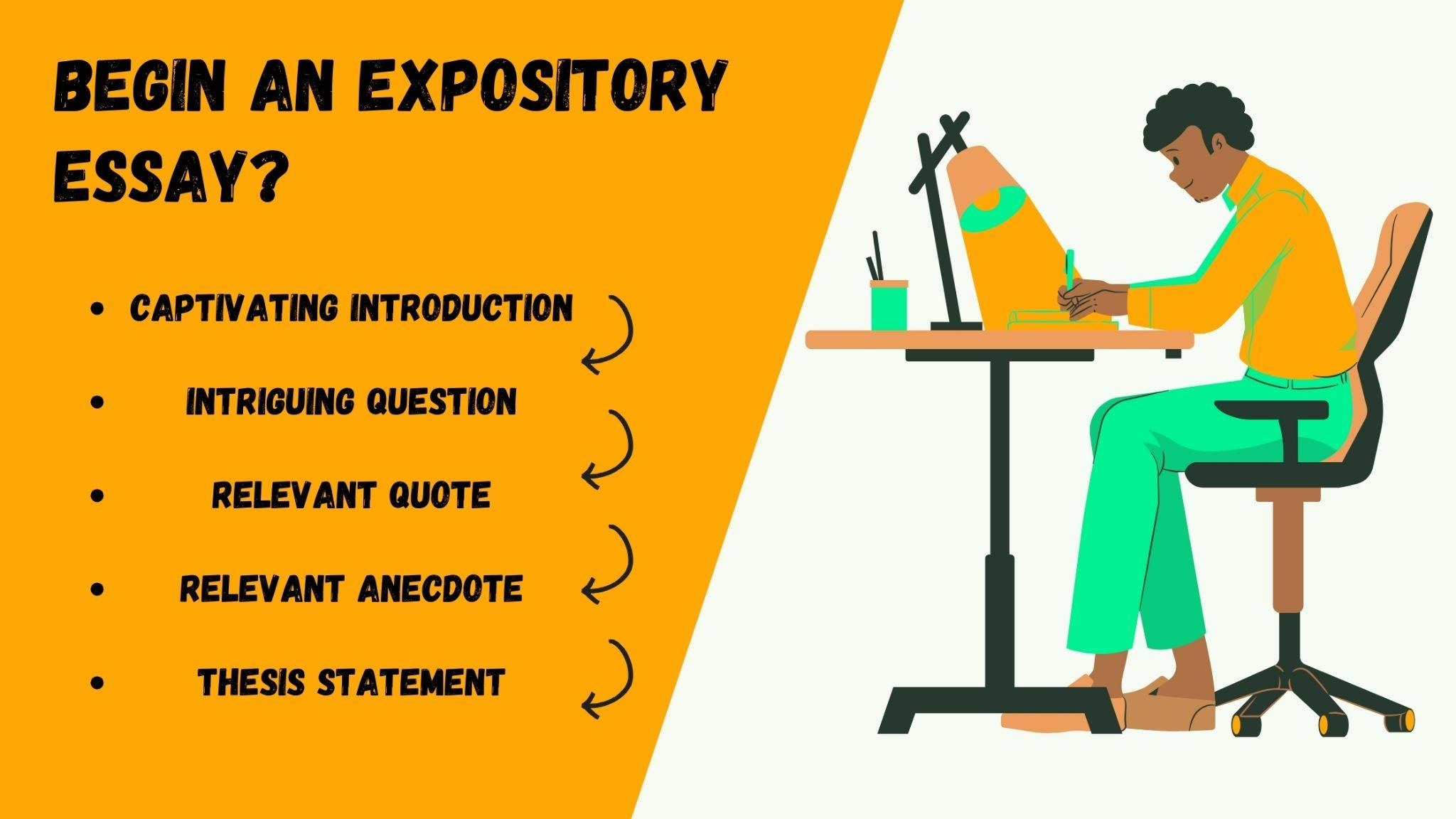
The beginning of any content has to be catchy in order to get the audience’s attention. Embarking on the journey of an expository essay is like inviting readers to explore uncharted territories. The start is crucial—it’s the first impression that can either captivate or lose your audience.
Here are effective ways to initiate an expository essay:
- Captivating Introduction: The introduction of your expository essay serves as the gateway to the entire piece. Consider beginning with a compelling fact or statistic related to your topic to captivate your audience from the outset. This fact should be intriguing and relevant, setting the stage for the informative journey ahead.
Example: If your essay delves into the wonders of space exploration, consider a captivating fact: “In the vastness of space, there are more possible iterations of a game of chess than there are atoms in the observable universe.”
2. Intriguing Question: An engaging question can stimulate the curiosity of readers and prompt them to think about the topic actively. The question you pose should be thought-provoking and directly related to the subject matter of your essay.
Example: For an essay on artificial intelligence, start with a question: “Have you ever wondered if machines could one day surpass human intelligence? The world of artificial intelligence holds some surprising answers.”
3. Relevant Quote: Quotes can be powerful tools for conveying the essence of your essay’s theme. Choosing a quote that resonates with your topic adds depth and perspective to your introduction.
Example: If exploring the impact of literature on society, incorporate a quote: “As Victor Hugo once said, ‘A writer is a world trapped in a person.'”
4. Relevant Anecdote: Anecdotes, whether personal or historical, can humanize your essay and provide a relatable entry point for readers.
Example: In an essay about overcoming challenges, share a personal or historical anecdote: “In the face of adversity, Helen Keller’s journey stands as a testament to the human spirit.”
5. Thesis Statement: The thesis statement is the backbone of your expository essay, providing a concise summary of the main point or argument. It should be clear, specific, and directly related to the focus of your essay.
Example: For an essay on climate change, present a clear thesis: “Climate change poses a pressing threat, and understanding its causes and effects is crucial for shaping a sustainable future.”
Starting an expository essay with one of these engaging approaches sets the tone for an informative yet captivating read.
There is no argument that the start of an expository essay should be very thoughtful. Still, there are some more things to be very careful about while writing an expository essay.
Things to avoid while writing an Expository essay.
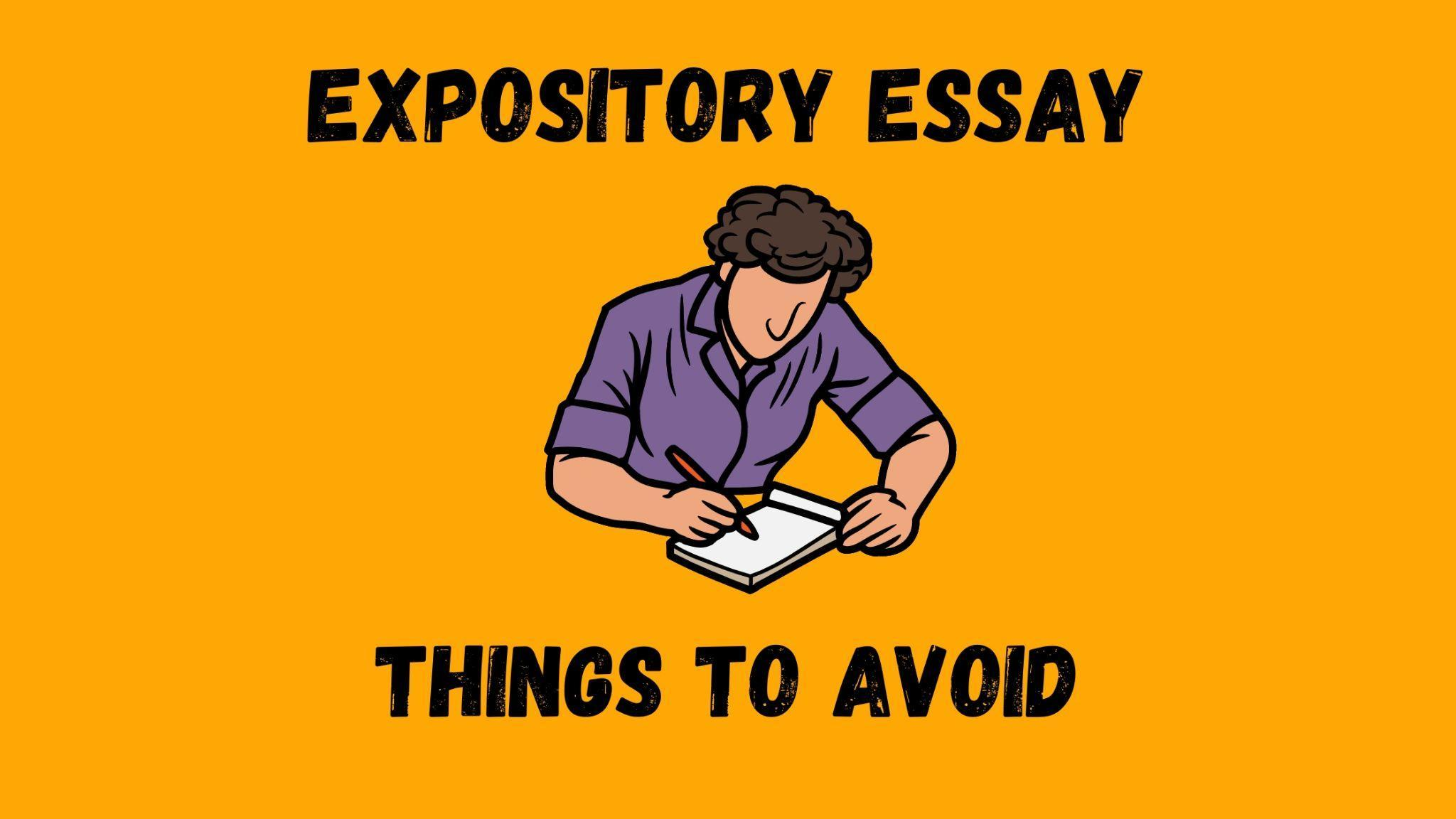
Writing a compelling expository essay requires careful consideration of both – what to include and what to avoid.
After a comprehensive explanation of how to write an expository essay and what to keep in mind while writing an expository essay, now lets understand some things to avoid while writing an expository essay.
Pointers to avoid while crafting your expository essay:
- Personal Opinions:
Avoid injecting personal opinions or biases into the essay.
Why: Expository essays are objective and should focus on presenting facts and evidence rather than personal viewpoints.
- First or Second Person Pronouns:
Avoid Using first-person pronouns (I, me, we) or second-person pronouns (you).
Why: Expository writing should maintain a formal tone and focus on the subject matter, not the writer or the reader.
- Emotional Language:
Avoid Using overly emotional or subjective language.
Why: Expository essays aim to inform objectively; emotional language can cloud the clarity of the information presented.
- Lack of Evidence:
Avoid Making statements without supporting evidence.
Why: An expository essay should be grounded in facts, statistics, examples, or expert opinions to enhance credibility.
- Ambiguity:
Avoid Vague or unclear statements.
Why: Clarity is key in expository writing. Ensure that ideas are presented in a straightforward and easily understandable manner.
- Overly Complex Language:
Avoid Using unnecessarily complex vocabulary.
Why: Simple, clear language enhances reader comprehension. Avoid jargon or complex terminology unless essential to the topic.
- Inadequate Transitions:
Avoid Abrupt transitions between paragraphs or ideas.
Why: Smooth transitions help guide the reader through the essay, providing a logical flow between different sections.
- Overgeneralization:
Avoid Making broad statements without proper qualifications.
Why: Overgeneralization can weaken the credibility of your essay. Be specific and provide concrete examples to support your points.
- Ignoring the Audience:
Avoid Neglecting to consider the knowledge level of your audience.
Why: Tailor your explanations to the intended audience, ensuring that your essay is accessible and relevant to them.
- Incomplete Research:
Avoid Relying on incomplete or unreliable sources.
Why: Thorough research is essential for providing accurate and credible information. Cross-check facts and use reputable sources.
- Ignoring Counterarguments:
Avoid Failing to address opposing viewpoints.
Why: Acknowledging counterarguments demonstrates a comprehensive understanding of the topic and adds depth to your essay.
- Wordiness:
Avoid Including unnecessary words or repeating ideas.
Why: Concise writing improves clarity. Trim unnecessary words to maintain a focused and efficient essay.
- Failure to Revise and Edit:
Avoid Submitting the first draft without revising and editing.
Why: Revising ensures that your essay is polished, coherent, and free from grammatical errors.
- Plagiarism:
Avoid Copying and pasting content without proper attribution.
Why: Plagiarism undermines the integrity of your work. Always give credit to original sources.
- Last-Minute Rush:
Avoid Procrastinating and writing the essay at the last minute.
Why: Planning and time management contribute to a well-thought-out and polished expository essay.
Content Writers should be careful of these pitfalls. This will enhance the quality and effectiveness of an expository essay, ensuring it serves its purpose of informing and enlightening the audience.
Expository Essay Topics
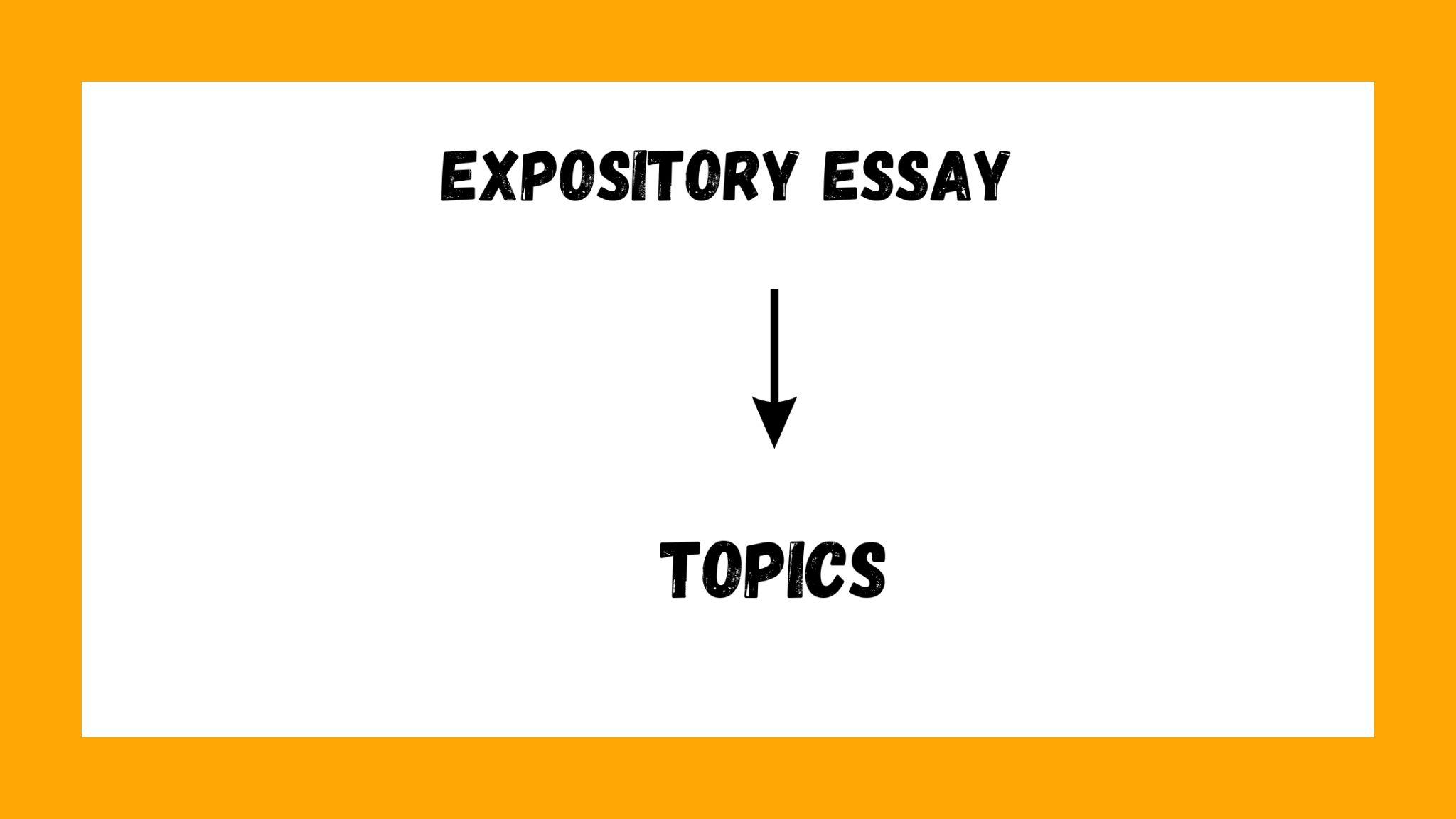
Selecting a compelling topic is crucial for a successful expository essay. Here’s a diverse list of expository essay topics across various categories to inspire your writing:
Science and Technology:
- The Impact of Artificial Intelligence on Everyday Life.
- Exploring Renewable Energy Sources: Pros and Cons.
- The Evolution of Space Exploration: Challenges and Achievements.
- The Role of Genetic Engineering in Agriculture.
- The Influence of Technology on Human Relationships.
Health and Wellness:
- Understanding the Benefits of Meditation for Mental Health.
- The Impact of Junk Food on Physical Well-being.
- Exploring Alternative Medicine: Myths and Facts.
- The Importance of Regular Exercise for a Healthy Lifestyle.
- The Rise of Mental Health Awareness: Breaking the Stigma.
Social Issues:
- The Effects of Social Media on Teenagers’ Self-Esteem.
- Exploring the Roots of Gender Inequality in the Workplace.
- The Impact of Climate Change on Global Communities.
- The Role of Education in Reducing Poverty.
- Analyzing the Phenomenon of Fake News in the Digital Age.
Historical Perspectives:
- The Causes and Consequences of World War I.
- Examining Ancient Civilizations: Contributions and Declines.
- The Impact of the Industrial Revolution on Society.
- The Women’s Suffrage Movement: Struggles and Triumphs.
- The Legacy of Martin Luther King Jr. in the Civil Rights Movement.
Literature and Arts:
- Analyzing Symbolism in Classic Literature.
- The Evolution of Film: From Silent to Technicolor.
- The Influence of Art Movements on Contemporary Design.
- The Power of Storytelling in Folklore and Mythology.
- The Impact of Music on Mood and Emotions.
Education and Learning:
- The Pros and Cons of Online Learning.
- The Importance of Teaching Critical Thinking in Schools.
- Exploring Different Learning Styles: Visual, Auditory, Kinesthetic.
- The Role of Technology in Modern Classrooms.
- The Benefits of Multilingual Education.
Environmental Issues:
- The Consequences of Deforestation on Biodiversity.
- Investigating the Great Pacific Garbage Patch.
- The Role of Individuals in Combating Climate Change.
- The Impact of Plastic Pollution on Marine Ecosystems.
- The Pros and Cons of Nuclear Energy as a Sustainable Option.
Travel and Exploration:
- The Cultural Significance of UNESCO World Heritage Sites.
- Sustainable Tourism: Balancing Exploration and Conservation.
- The Wonders of Underwater Caves: A Hidden World.
- Exploring Ancient Ruins: Preserving History Through Tourism.
- The Impact of Travel on Personal Growth and Perspectives.
Social Media and Communication:
- The Influence of Social Media on Political Movements.
- Cyberbullying in the Digital Age: Causes and Solutions.
- The Role of Social Media in Shaping Popular Culture.
- The Impact of Influencers on Consumer Behavior.
- Privacy Concerns in the Era of Information Sharing.
Hobbies and Leisure Activities:
- The Art of Photography: Telling Stories Through Images.
- Exploring Different Styles of Cooking Around the World.
- The Benefits of Gardening for Mental Health.
- The History and Evolution of Board Games.
- The Impact of Video Games on Cognitive Skills.
Personal Development:
- The Importance of Goal Setting for Personal Success.
- Overcoming Adversity: Stories of Resilience.
- Developing Effective Communication Skills in the Workplace.
- The Psychology of Decision-Making: Influences and Strategies.
- The Role of Emotional Intelligence in Leadership.
Global Issues:
- Human Trafficking: Causes, Effects, and Solutions.
- The Refugee Crisis: Understanding the Challenges.
- The Impact of Globalization on Local Cultures.
- The Rise of Populism in Contemporary Politics.
- The Role of International Organizations in Promoting Peace.
Choose a topic that aligns with your interests and allows for in-depth exploration. Remember to focus on providing clear information and supporting evidence in your expository essay.
Expository Essay Examples
Some examples of expository essays are –
- Newspapers
- Magazine articles
- Instruction manuals
- Encyclopedias
- School textbooks, etc.
Examples –
- Western Medicine vs. Alternative Eastern Medicines-Expository Essay
| The shift from traditional to current methods of treating diseases has improved the quality of many services, products, and processes. However, many regions worldwide are still applying traditional medicines (Stefanov et al., 2020). Therefore, conventional Western medicine and alternative Eastern medicine are two recognized approaches to treating multiple diseases. Researchers have developed the foundational differences between these two approaches that have helped establish the pros and cons of each. Each approach has advantages and drawbacks. There have been debates on which approach is cheaper in terms of time and cost of treatment. Also, there is ongoing concern about which approach is safer than the other. |
- Social media and mental health
| As of 2019, there were over 3.5 billion social media users globally, and this figure still increases by 9% each year. It is impossible to deny that social media has become an important part of many people’s lives. There are various positive effects linked with the platforms, including better connectivity. However, addiction to social media platforms, the increased comparisons between individuals, and the fear of missing out have increased depression and sadness. Social media addiction has become rampant, which has negatively influenced the lives of many individuals in society. Checking and scrolling through the different social media platforms has become increasingly popular over time, leading to excessive and compulsive use. |
Tips for Writing the Expository Essay

An effective expository essay requires careful planning, organization, and adherence to key principles. Here are some valuable tips to enhance your expository writing skills:
- Understand Your Audience:
Consider who will be reading the essay. Tailor the language and examples to match the knowledge level and interests of the intended audience.
- Choose a Clear and Concise Thesis:
Clearly state the main point or argument of the essay in the thesis statement. This should guide the reader on what to expect in the essay.
- Research Thoroughly:
Conduct comprehensive research on the chosen topic. Use reputable sources to gather accurate information and data that support the thesis.
- Plan Your Structure:
Create an outline before starting to write. A typical expository essay structure includes an introduction, three body paragraphs (each with a separate point of evidence), and a conclusion.
- Craft a Compelling Introduction:
Begin with a hook to grab the reader’s attention—this could be a surprising fact, a relevant quote, or an intriguing question. Provide background information and present the thesis statement clearly.
- Focus Each Paragraph on a Single Point:
Each body paragraph should cover a specific aspect related to the thesis. Present the main point, support it with evidence, and ensure a smooth transition to the next paragraph.
- Provide Evidence and Examples:
Back up the points with credible evidence, examples, or statistics. This not only strengthens the argument but also adds depth and authenticity to the essay.
- Maintain Objectivity:
Remember that expository essays are objective, not subjective. Avoid inserting personal opinions or emotions into the narrative.
- Use Clear and Concise Language:
Write in a straightforward and easily understandable manner. Avoid unnecessary jargon or complex language unless it is crucial to the topic.
- Create Smooth Transitions:
Ensure a logical flow between paragraphs and ideas. Use transition words and phrases to guide the reader through your essay seamlessly.
- Conclude Effectively:
Summarize the main points discussed in your essay, restate the thesis in a fresh way, and leave the reader with a thought-provoking idea or a call to action.
- Revise and Edit:
Review the essay for clarity, coherence, and consistency. Check for grammatical errors, punctuation, and spelling mistakes. Revise sentences to enhance overall readability.
- Consider Peer Feedback:
If possible, seek feedback from peers or instructors. Fresh perspectives highlight areas that may need improvement.
- Avoid Plagiarism:
Always provide proper citations for any information, ideas, or quotes taken from other sources. Plagiarism undermines the credibility of your work.
- Proofread Aloud:
Read the essay aloud to identify awkward phrasing, unclear sentences, or grammatical errors. This can help catch mistakes that may be overlooked during silent proofreading.
- Follow Assignment Guidelines:
Pay close attention to the specific guidelines provided by the instructor. Ensure that the essay meets the required format, length, and other criteria.
By incorporating these tips into the expository writing process, a content writer can enhance the clarity, coherence, and overall effectiveness of the expository essay.
Remember that practice and continuous refinement are essential for improving expository writing skills over time.
You can visit our website to learn more about our essay writing services.
FAQs
Q. How many types of expository writing are there?
A. There are five main types of expository essays –
- Classification essay
- Definition essay
- Process essay
- Compare and contrast essay
- Cause and effect essay
Q. What are the 4 characteristics of expository writing?
A. 4 main characteristics of expository writing are as follows-
- Straight forward message
- Clear structure
- Includes examples and evidence
- No surprises in the content
Q. What are some effective ways to initiate an expository essay?
A. Here are five effective ways to initiate an expository essay.
- Captivating introduction
- Intriguing question’
- Relevant quote
- Relevant anecdote
- Thesis statement
Use any one of this or a combination of this for a good impact in the beginning.
Q. What is the first important step in writing an expository essay?
A. The first step in writing an expository essay is to start with an introduction. This serves to hook the reader’s interest, briefly introduce the topic, and provide a thesis statement summarising what will be the content about.


